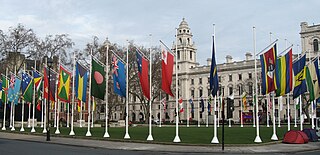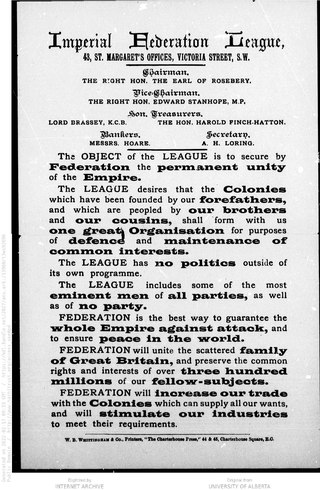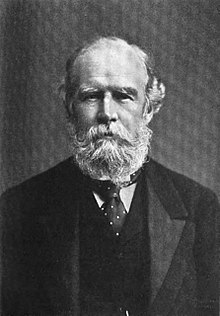
Edward VII was King of the United Kingdom and the British Dominions, and Emperor of India, from 22 January 1901 until his death in 1910.

A Commonwealth realm is one of a group of sovereign states within the Commonwealth of Nations that have the same person, currently King Charles III, as their monarch and head of state. All the realms are independent of each other, although one person, resident in the United Kingdom, acts as monarch of each. Except for the UK, in each of the realms the monarch is represented by a governor-general. The phrase Commonwealth realm is an informal description not used in any law.

John Frederick Denison Maurice was an English Anglican theologian, a prolific author, and one of the founders of Christian socialism. Since the Second World War, interest in Maurice has expanded.

Sir John Robert Seeley, KCMG was an English Liberal historian and political essayist. A founder of British imperial history, he was a prominent advocate for the British Empire, promoting a concept of Greater Britain. This he expounded in his most widely known book The Expansion of England (1883). While he was an early advocate of the establishment of political science as a distinct academic discipline, he retained a theological approach in which this was embedded.

Richard Burdon Haldane, 1st Viscount Haldane, was a Scottish lawyer, philosopher, an influential British Liberal and later Labour politician and statesman. He was Secretary of State for War between 1905 and 1912 during which time the "Haldane Reforms" of the British Army were implemented. As Secretary of State of War, he was instrumental in founding MI5, MI6, the Territorial Army, the British Expeditionary Force, and the Royal Air Force. Beyond his military contributions, Haldane was a significant figure in education, contributing to the founding of institutions such as Imperial College London and the London School of Economics. His efforts have left a lasting impact on both the UK's defense and educational landscapes.

Commonwealth Day is the annual celebration of the Commonwealth of Nations, held on the second Monday in March. While the date holds some official status in select member states of the Commonwealth, observances of the date are not uniform across the Commonwealth, and the date is not celebrated as a public holiday in most Commonwealth countries.

The British Empire Exhibition was a colonial exhibition held at Wembley Park, London England from 23 April to 1 November 1924 and from 9 May to 31 October 1925.

The Imperial Federation was a series of proposals in the late 19th and early 20th centuries to create a federal union to replace the existing British Empire, presenting it as an alternative to colonial imperialism. No such proposal was ever adopted, but various schemes were popular in Australia, Canada, New Zealand, and other colonial territories. The project was championed by Unionists such as Joseph Chamberlain as an alternative to William Gladstone's proposals for home rule in Ireland.

A coalition of the Conservative and Liberal Unionist parties took power in the United Kingdom shortly before the 1895 general election. Conservative leader Lord Salisbury was appointed Prime Minister and his nephew, Arthur Balfour, became Leader of the House of Commons, but various major posts went to the Liberal Unionists, most notably the Leader of the House of Lords, the Liberal Unionist Duke of Devonshire, who was made Lord President, and his colleague in the Commons, Joseph Chamberlain, who became Colonial Secretary. It was this government which would conduct the Second Boer War from 1899–1902, which helped them to win a landslide victory at the 1900 general election.

The provinces of India, earlier presidencies of British India and still earlier, presidency towns, were the administrative divisions of British governance on the Indian subcontinent. Collectively, they have been called British India. In one form or another, they existed between 1612 and 1947, conventionally divided into three historical periods:
Opposition to the Second Boer War occurred both within and outside of the British Empire. Among the British public, there was initially much support for the war, though it declined considerably as the conflict dragged on. Internationally, condemnation of the British role in the war came from many sources, predominately left-wing and anti-imperialist commentators. Inside Britain, influential anti-war groups, especially those consisting of members of the opposition Liberal Party, quickly formed. They campaigned ineffectually against British wartime policies, which were supported by the Conservative Party of Prime Minister Lord Salisbury.
Robert William Dewar Boyce is a professional historian and was a senior lecturer in International History at the London School of Economics and Political Science (LSE). His main fields of interest are French external relations in the twentieth century, the role of economics, business and banking in modern international relations, Canadian external relations since 1900, and the modern history of international communications.

Palgrave Macmillan is a British academic and trade publishing company headquartered in the London Borough of Camden. Its programme includes textbooks, journals, monographs, professional and reference works in print and online. It maintains offices in London, New York, Shanghai, Melbourne, Sydney, Hong Kong, Delhi and Johannesburg.

Albert Denison Denison, 1st Baron Londesborough, KCH, FRS, FSA, was a British Whig Party politician and diplomat, known as Lord Albert Conyngham from 1816 to 1849.

Francis Bertie Boyce, commonly referred to as Archdeacon Boyce, was an Australian clergyman and social reformer.
The Panic of 1847 was a major British commercial and banking crisis, possibly triggered by the announcement in early March 1847 of government borrowing to pay for relief to combat the Great Famine in Ireland. It is also associated with the end of the 1840s railway industry boom and the failure of many non-bank lenders. The crisis was composed of two phases, one in April 1847 and one in October 1847, which was more serious and known as 'The Week of Terror'.

The Imperial Federation League was a 19th-century organisation which aimed to promote the reorganisation of the British Empire into an Imperial Federation, similarly to the way the majority of British North America confederated into the Dominion of Canada in the mid-19th century. The League promoted the closer union of the British Empire and advocated the establishment of "representative government" for the UK, Canada and the self-governing colonies of 'Australasia' and Cape Colony within a single state.

Sir George Robert Parkin was a Canadian educator, imperialist, and author.
Boyce is a surname. Notable people with the surname include:















